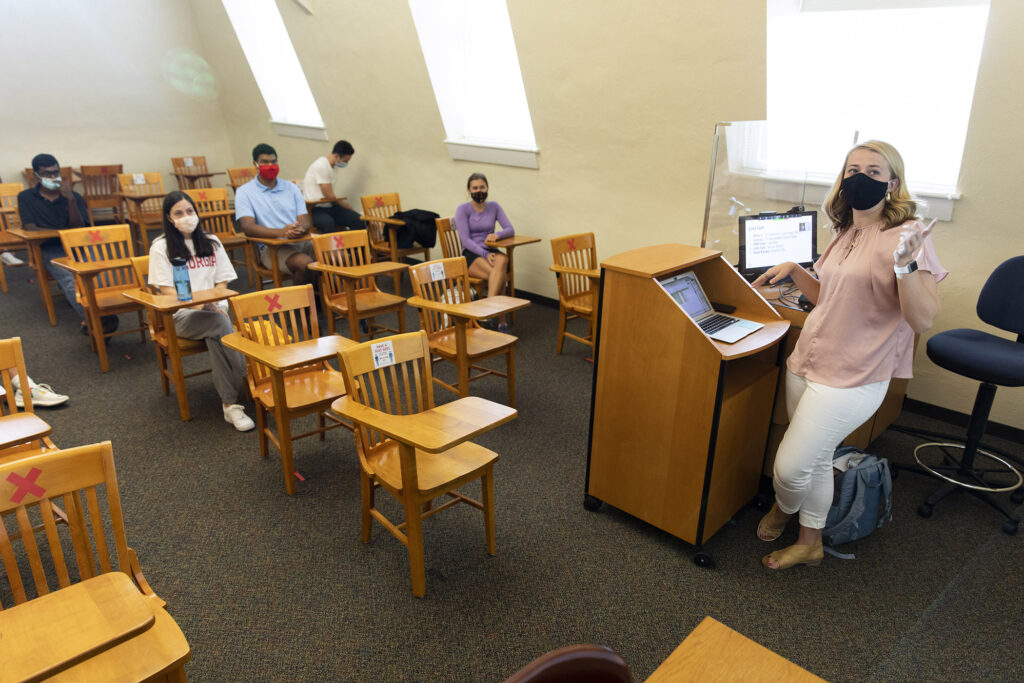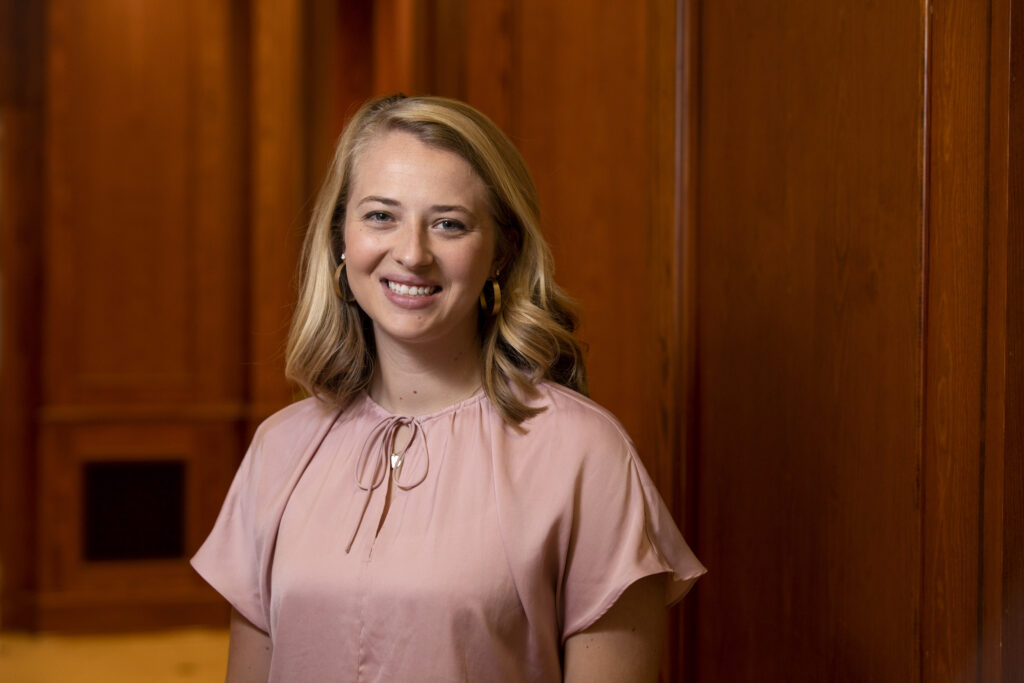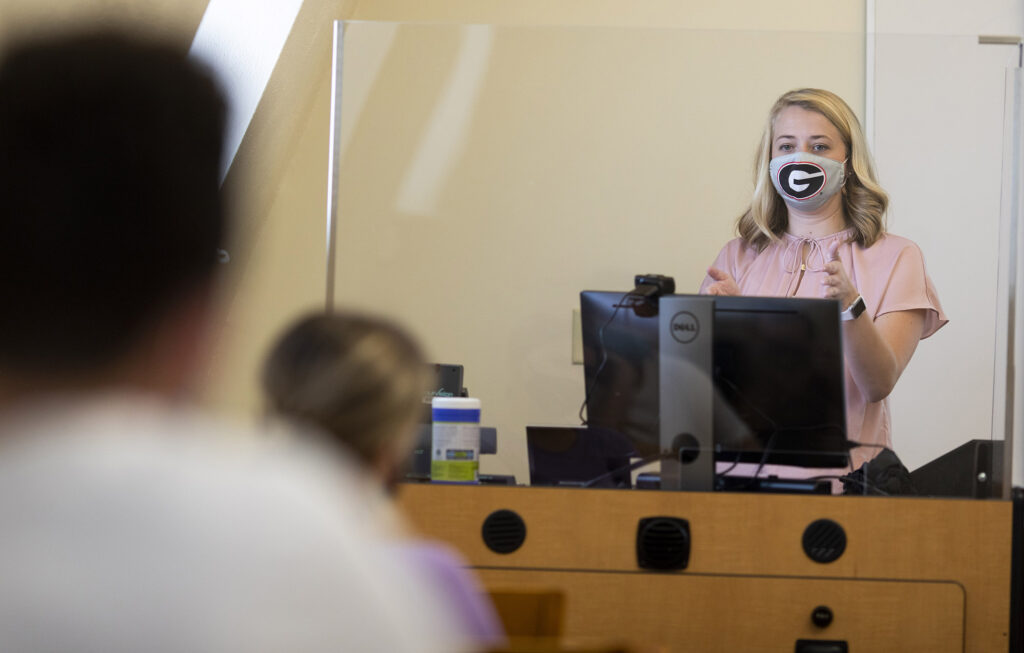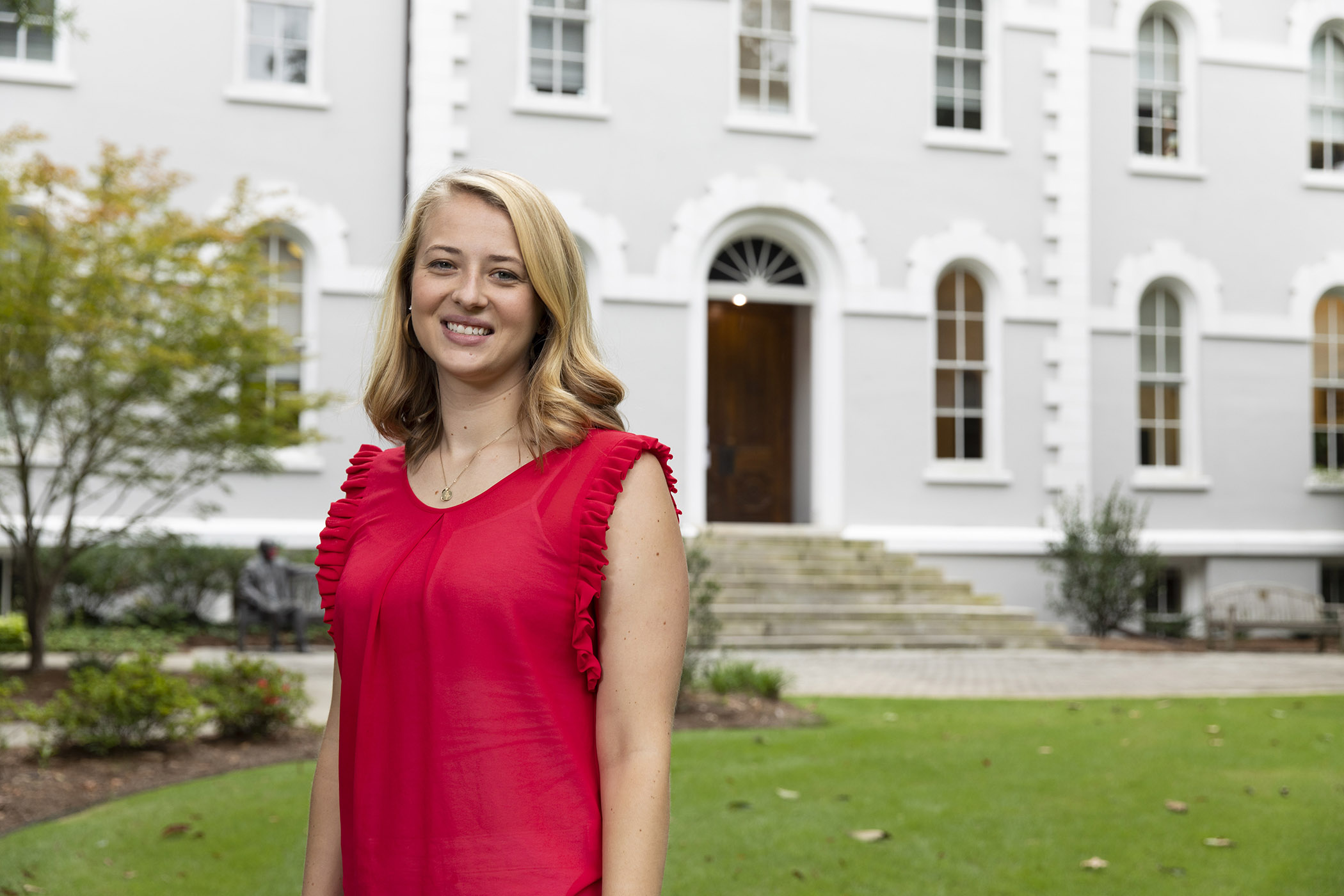“If you’re going to be there, a place shouldn’t be the same when you leave.”
That’s the advice senior Elizabeth Carter lives by in college.
She hopes when she graduates in May 2021 that the University of Georgia and the School of Public and International Affairs will be better than when she arrived.
Carter, an international affairs major who is also pursuing a master’s degree in international policy through the Double Dawgs program, got the advice from her high school English teacher. She also gave the advice to the students in the Honors Freshman Seminar she taught this past fall.
It’s the third class she’s been a teaching assistant for—she previously helped with Introduction to Global Politics taught by Loch Johnson and taught and co-taught the Honors Policy Scholars Seminar course.
Being a TA, “you learn so much,” she said. “It was more than curating material and presenting topics. In reading everyone’s policy papers, I benefited far more than I think they did, because I got to learn from all of them. It’s been one of my favorite experiences at UGA.”

Her impact
One of her proudest accomplishments at UGA is starting the SPIA peer mentorship program for students. Carter had gone through the Honors Program Student Council’s Peer Assisted Leadership, or PAL, mentorship program, and thought it was so helpful she wanted to bring that model to her college.
The program pairs first- and second-year students with third- and fourth-year student mentors. The idea is the mentors will give younger students advice and ideas for being involved on campus and in the community. They might tell younger students about their experience doing research for a professor, or how they got the opportunity. It’s all about making connections—whether that’s with other students, professors or alumni—so that students can find the right opportunities, from courses to take to internships to apply for during their time at UGA.
For example, Carter was a mentee in the PAL program. Her Honors mentor Margaret Beckley (’19) showed her “the willingness of older students and recent graduates to pour [knowledge and experience] into younger students.” Beckley demonstrated the joy in mentoring and setting up a short call or meeting over coffee to chat about experiences and impart the advice they had accrued along the way.
“Now as a mentor myself, I understand first hand how exciting it is to be able to help younger students who are in the place I was so recently and to share with them the resources and opportunities that my mentors shared with me,” Carter said.
One piece of advice she gives her mentees is to “always reach out to call or setup a meeting with people they find interesting. The worst that can happen is that they say they’re busy, but a great outcome costs them nothing and is incredibly probable.”
To date, more than 250 students have gone through the program, and Carter hopes it continues after she graduates.
Development and aid work
Broadly, Carter is interested in matching help and resources with those who need the assistance—especially on a global scale. She wants to support a transition to community-led international development and greater consciousness about both the positive and negative impact of private sector engagement.
Her interest goes back to a high school voluntourism trip to Guatemala. She visited the country and worked for a week at a pop-up clinic for families. She left wondering why the money she spent wasn’t just given to locals who could do the job. “Does it give us the results we want?” she asked. “We want communities that are resilient, self-sustaining, who are in charge of their own development.” Through her SPIA coursework, she found that many people were asking this same question. She then worked to better understand these trips and the efficiency around international aid.
For a CURO project in 2019, she researched ways to bring clean water to Karachi, Pakistan—where a water mafia syphons the water before it gets to the city and then controls and sells the water. Her idea was that UPS, with its cutting-edge logistics and tracking, would be a good partner for the project, helping to make sure the water gets to the city and its residents. As she has explored more critically private sector engagement in international development, she has come to realize that the partnerships are not always equally as beneficial to the communities.

Learning opportunities
At UGA, Carter has worked in development for the College of Agricultural and Environmental Sciences, then in development for the Honors Program. For the last two years, she’s worked in the School of Public and International Affairs’ communications and development office.
She interned for three semesters at the Carl Vinson Institute of Government as part of the Security Leadership Program, where she researched the migrant crisis in South Africa and then visited Washington, D.C., where she ultimately wants to work.
She’s interned twice in Washington, D.C. In 2019, she interned for the state department, specifically in the U.S. President’s Emergency Plan for AIDS Relief (PEPFAR), for the global aid coordinator. She participated in UGA’s Washington Semester program and lived in UGA’s Delta Hall. She served as the liaison between the state department’s Diplomat in Residence for the South and SPIA/UGA and helped to host recruitment events for UGA students.

The PEPFAR internship solidified her interest in international development. And in summer 2020, she interned at the UPS Global Public Affairs office in Washington, D.C, where she got to see the private sector point of view of international aid.
It was pure luck, she said, after a previous internship was canceled in March because of the pandemic.
There, she got to live in the UPS townhome, and she worked with the office’s international team. She helped research USMCA—the U.S.-Mexico-Canada Agreement, the trade agreement that replaced NAFTA—and its implementation. She helped draft and edit testimony on World Trade Organization reform her office gave to the Senate Finance Committee.
She also worked on the UPS Women Exporters Program, which connects women around the world to market access opportunities. She mocked up a website with a comprehensive list of resources for women. Her boss had been trying to get the project approved for three years, and at 2:30 p.m. on Carter’s last day at the internship, the project was approved and handed over to the design team to implement.
Ultimately, Carter’s dream job would be working for the United Nations, helping to examine how public-private partnerships impact communities, and making sure community voices and leadership are heard. Carter hopes to one day return to the State Department to continue work in international aid. Until then, she’s considering a Ph.D. program and applying to positions in the international development.


